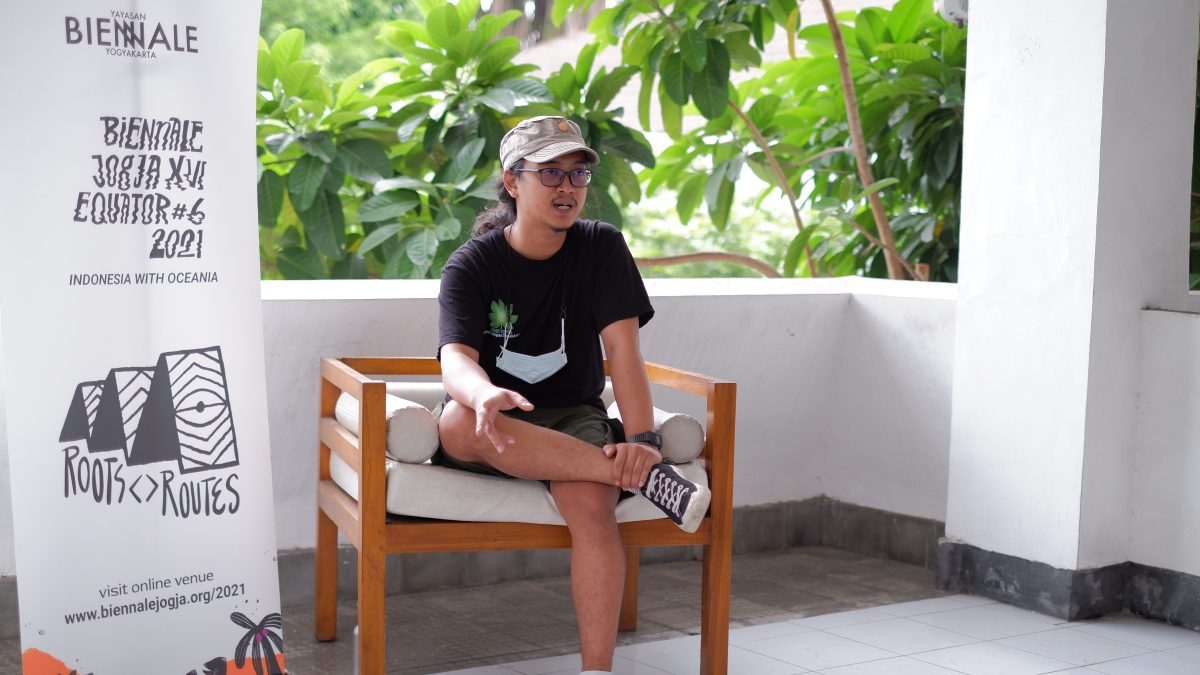
Arif Budiman
Arif Budiman is an artist who works a lot through moving images as one of his main media. He is active in several communities, such as MES 56 and Pirbing Tirbing. Arif is one of the artists participating in the main exhibition of the Biennale Jogja XVI Equator #6 2021.
Arif’s first involvement in the Biennale Jogja this year was started by participating in the Asana Bina Seni Program the previous year. At that time, Arif presented his work on issues that occurred in Papua. He saw how the media was silent and many news stories were distorted so that what happened in Papua did not reflect the actual events. In the end, one of the curators of this year’s Biennale Jogja, Elia Nurvista, invited him to rejoin and to present his work. He is also an artist participating in the residency of the Biennale Jogja XIV Equator #6 2021.
Arif went on a residency trip that should have lasted two weeks but was extended to two months. Within that time range, he managed to access several places and sources as needed.
Before his Papua residency trip, Arif had already made a list of places he wanted to visit to gather information. What exactly is happening in Papua, and then what are the issues that have been happening all this time?
For Arif, being in Papua is like being in Jabodetabek. There’s a huge number of immigrants and it can be said that only 50% of Papuans are native Papuans.
Arif’s first impression of arriving in Papua was that betel nuts and cigarettes became a bridge to build relationships and socialize with Papuans. Betel nut is a good contact tool if you want to talk to new people. Especially if you chew it, which can create intimacy with them. Betel nut is also an identity for Papuans.
Various issues that Arif had heard while in Java truly happened there, but were different from what was conveyed by the media. When he knew in depth what really happened from various sources regarding violence, discrimination, all of that became a self-reflection for Arif.
Other issues that arise are the difficulty of finding work, land, forests, and so on. How can land and forests be taken from the Papuan people if those are their source of living?
In Papua, Arif had many discussions with people about postcolonialism, decolonization, which was even raised today at the Biennale Jogja and it became an issue that worried him
One of the communities Arif met in Papua is Papuan Voices. They are a community that focuses on activism and documentary films in Papua, where the majority of its members are indigenous Papuans.
Interestingly, the Papuan Voices community is aware of the many problems they voice through the medium of moving images. They always wrap their work into documentary films. Papuan Voices strongly believes that documentaries can present real events that occurred in Papua to the wider community.
The experiences and information that Arif gained while in Papua then coalesced into a work that was presented at the Biennale Jogja XVi Equator #6 2021. He collaborated with Harun Rumbarar and Max Binur, an artist and activist who often voices problems in West Papua through the medium of music and movie.
“Thank you to Biennale Jogja for this opportunity, giving me a place to study and sending me to residency in Papua and making me an artist in the main exhibition of the Biennale Jogja. It’s a relief because the issues raised regarding decolonization have become our openness to the Papuan people,” said Arif Budiman.